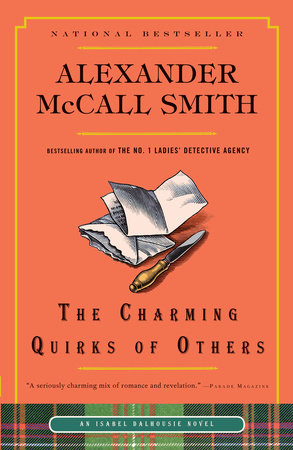The Charming Quirks of Others Reader’s Guide
By Alexander McCall Smith


1. In an Entertainment Weekly interview Alexander McCall Smith was asked which fictional character he most identifies with, and he answered, “Isabel Dalhousie and I agree on just about everything. She seems to think as I do.” Which one of his characters do you most identify or agree with?
2. One of the early reviews called The Charming Quirks of Others “a powerful demonstration of McCall Smith’s ability to dramatize the ways everyday situations spawn the ethical dilemmas that keep philosophers in business.” (Kirkus Reviews) Describe some of the dilemmas in the book and discuss what you would have done in Isabel’s or another character’s place.
3. The novel opens with Isabel and Guy Peploe discussing gossip. How does this conversation allude to later events in the book? What is your feeling on gossip? Is it harmless and/or pointless? Does it have real purpose in social settings?
4. Do you agree with Isabel when she considers that “people were only too ready to believe things that were manifestly untrue” and that people are happy to hear others cast in a negative light? Do you think we all do this despite our better judgment?
5. The author discusses the dilemma of a working mother in this novel. “I could spend all my time with Charlie, which is what I would love to do. But would I be any happier? And would it make any difference to Charlie?” Discuss this, and how child rearing is extremely important for a mother, but so is working and feeling responsible for something outside the home. If you have children, did you go to work while raising them or did you stay home, and how did you come to your decision to do one or the other?
6. Isabel often acts on her intuition; sometimes it leads her to the truth, sometimes not. What is your opinion about acting with your gut, or on simple intuition? Discuss some situations where your intuition was correct, and some where it was not.
7. Discuss the theme of forgiveness in the novel.
8. What do you think the author is saying about different kinds of love in the novel (loving your children, your partner, your friends, all of humanity)?
9. What do you make of the title? If we look at others faults as charming or positive, would it be easier to accept or put up with them? And if we openly accepted our own faults, would it be easier to accept others faults? What does Isabel think?
10. Isabel is jealous of Jamie and his friendship with a fellow musician. How does she overcome her jealousy? What are other ways people overcome jealousy? Are there situations where one should simply accept your jealousy and address it head on?
11. Discuss the importance of songs and poetry in this and in all of Alexander McCall Smith’s novels. What role does music and poetry play in the novels and in life?
12. Who are some of the poets that Alexander McCall Smith often quotes in his novels, especially in this Isabel Dalhousie series? Who are some of your favorite poets?
13. Another important cultural element in Isabel’s life, in addition to music and poetry, is art. Various artists are mentioned and this novel focuses on a particular piece of art by Scottish painter Raeburn. How is art tied to Isabel’s life and this novel? Why is Isabel generous with this particular painting of her ancestor?
14. How do art and music help Isabel deal with the ethical issues that pop up in the novels and with the detective work she does “helping” others?
15. Isabel wishes for happiness for Harold Slade, whom she really does not care for and who is a bit of a bully, and she states, “Although it’s harder to love, it’s always better.” Do you agree? Discuss a situation you’ve been in where this worked for you.
16. Do you agree with the final phrase of the book, “Loving anything with all your heart always brings about understanding, in time.” How does this sentence epitomize or summarize the novel for you?
(For a complete list of available reading group guides, and to sign up for the Reading Group Center enewsletter, visit www.readinggroupcenter.com)